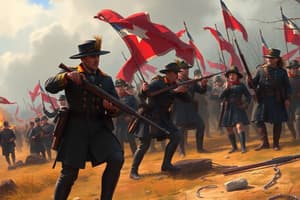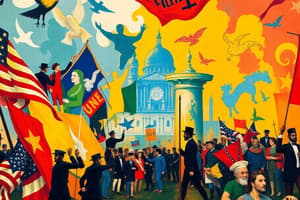Podcast
Questions and Answers
Which of the following best differentiates the study of history from the study of civics?
Which of the following best differentiates the study of history from the study of civics?
- History incorporates concepts like democracy and totalitarianism, conversely, civics emphasizes the evolution of cultures.
- History mostly uses secondary sources when conducting research, unlike civics that focuses on primary documents.
- History focuses on current governmental structures whereas civics examines past societies.
- History analyzes cause and effect relationships of events over time, while civics examines citizen rights and responsibilities within a state. (correct)
A geographer studying the impact of industrialization on a local ecosystem would primarily be working within the domain of:
A geographer studying the impact of industrialization on a local ecosystem would primarily be working within the domain of:
- Human geography, analyzing the relationship between people and their environment. (correct)
- Historical geography, examining how past industrial practices differed from today's.
- Physical geography, with an emphasis on natural landform changes.
- Political geography, focusing on government regulations on industry.
Which of the following scenarios would be least relevant to a historian but most relevant to a civics scholar?
Which of the following scenarios would be least relevant to a historian but most relevant to a civics scholar?
- A detailed study of the factors that led to the French Revolution.
- An analysis of the different interpretations of the Roman Empire.
- A comparative study of the democratic processes in different nations. (correct)
- Research on the impact of the trans-Atlantic slave trade on African cultures.
A study that explores the correlation between the adoption of new agricultural techniques and the change in political power structures within a kingdom would most appropriately integrate which two fields?
A study that explores the correlation between the adoption of new agricultural techniques and the change in political power structures within a kingdom would most appropriately integrate which two fields?
Which aspect of geography most closely concerns the study of different climate zones and weather patterns?
Which aspect of geography most closely concerns the study of different climate zones and weather patterns?
Flashcards
What is history?
What is history?
The study of past events, especially those involving human societies and cultures. It involves examining sources, analyzing cause-and-effect relationships, and understanding different historical perspectives.
What is civics?
What is civics?
The study of citizens' rights and responsibilities within a state or nation. It explores how governments work, the different forms of government, and the principles of justice and law.
What is human geography?
What is human geography?
Examines how people interact with their environment, including population distribution, cultural patterns, and economic activities.
What is physical geography?
What is physical geography?
Signup and view all the flashcards
What is geography?
What is geography?
Signup and view all the flashcards
Study Notes
History
- History is the study of past events, particularly in human affairs.
- It involves examining various societies and cultures across time periods.
- Historians rely on primary sources (original documents, artifacts, etc.) and secondary sources (interpretations and analyses of primary sources) for their research.
- Key historical themes include political developments, social movements, economic changes, and cultural evolution.
- Historical study often involves analyzing cause and effect relationships between events.
- Different schools of historical thought exist, each with unique perspectives on the past.
Civics
- Civics is the study of the rights and responsibilities of citizens within a state or nation.
- It explores the various forms of government and political systems.
- Key aspects of civics include the structure of government, the roles and functions of different branches of government, and the principles of law and justice.
- It also examines the relationship between citizens and their governments.
- This field encompasses topics such as elections, political processes, civic participation, and public policy.
- Understanding fundamental rights, individual liberties, and civic duties are core components of civics.
- Concepts like democracy, republic, monarchy, and totalitarianism are crucial parts of studying various forms of governance.
Geography
- Geography is the study of the Earth's surface, including its physical features, climate, inhabitants, and the interactions between them.
- It encompasses both physical and human geography.
- Physical geography examines the natural environment, including landforms, bodies of water, and climate patterns.
- Human geography explores the relationship between people and their environment, including population distribution, cultural patterns, and economic activities.
- Geographic concepts include location (absolute and relative), place, region, movement, and human-environment interaction.
- Map-making and spatial analysis play a significant role in understanding geographic data.
- Human activities, such as urbanization, industrialization, and agriculture, significantly impact the environment and landscapes on Earth.
- Climate change and its global effects are crucial topics in contemporary geography.
- Regions are a key concept in geography, encompassing areas with similar characteristics.
- Understanding different climate zones and weather patterns is essential.
- Globalization and its effect on the distribution and interaction of people and societies is a contemporary concern.
Studying That Suits You
Use AI to generate personalized quizzes and flashcards to suit your learning preferences.




